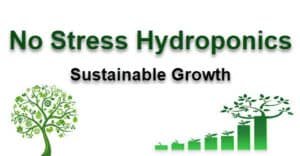Hydroponic plants grow faster than traditional soil-based plants because they get their nutrients directly from the solutions rather than through the medium or soil. There are various other advantages to gardening with hydro-systems; however, understanding how long they take to mature is important.
The rate at which hydroponic plants grow can be affected by a variety of factors such as lighting levels, temperature, humidity level and nutrients provided via wastewater systems.
In this article, we will discuss these elements for achieving better results when growing hydroponic produce. By knowing how fast do hydroponic plants grow can help you maximize your yields from your garden space more easily and effectively.
What is Hydroponics?
Hydroponics is a method of growing plants without soil. Instead, the roots of the plants are submerged in a liquid nutrient solution that provides all the essential elements for growth.
The nutrient solution contains all the necessary minerals, oxygen, and water for proper plant development. Hydroponic systems can be used to grow any type of plant from vegetables to flowers to herbs.
Benefits of Growing with Hydroponics
One of the main benefits of growing with hydroponics is that it allows plants to grow faster than in traditional soil-based methods. This is because the nutrient solution contains all the essential elements for growth and the roots are not limited by soil nutrients. Additionally, hydro-gardening systems can be tailored to meet specific needs, such as high levels of light or supplemental nutrients for certain plants.
Another benefit of hydroponic gardening is that it requires less water and space than traditional soil-based gardening methods. The nutrient solution used in hydroponic systems can be recycled, reducing water waste. Additionally, hydroponic systems require less space than soil-based gardens since the plants are grown in a contained environment.
How Fast Do Hydroponic Plants Grow?
Hydroponic plants typically grow faster than traditional soil-based plants due to the direct access to nutrients they receive. This is because hydroponic systems provide the necessary elements for growth directly from a nutrient solution, eliminating the need for soil.
The rate at which hydroponic plants grow can be affected by a variety of factors such as lighting levels, temperature, and humidity. With proper lighting, temperature, and humidity levels, hydroponic plants can grow up to 25-50% faster than soil-based plants.
Types of Hydroponic Systems
Hydroponic systems come in a variety of shapes and sizes, allowing for a range of different approaches to growing plants. The most common type of hydroponic system is the Deep Water Culture (DWC) which uses an air pump to supply oxygen to the roots as they are suspended in a nutrient-rich solution.
Another type of hydroponic system is the Ebb and Flow system which uses a timer to periodically flood the roots with nutrient solution before draining it away. Nutrient Film Technique (NFT) systems are also popular and rely on a constant flow of nutrient solution to be pumped over the roots.
Factors that Influence Plant Growth Rate in Hydroponics
Here are the factors that influence plant growth rate:
Lighting Levels
The amount and type of light that plants receive plays an important role in how quickly hydroponic plants can grow. Plants need light for photosynthesis, the process by which they convert energy from the sun into food. Without proper lighting levels, plants can become spindly or weak as their growth is hindered by the lack of energy available to them. For best results, hydroponic systems should be situated near a bright window or use artificial lighting such as LED lights or fluorescent bulbs.
Temperature
Temperature is another important factor when it comes to hydroponic plant growth. Plants grow best in temperatures between 65-80°F (18-27°C). Temperatures that are too high or too low can hinder the growth rate of plants and even cause them to become stunted or fail to thrive. To ensure optimal temperatures, a thermometer should be used to monitor the temperature of the room or greenhouse where the hydroponic system is installed.
Humidity Levels
The amount of moisture in the air also plays an important role in how quickly plants can grow in a hydroponic system. Humidity levels should remain between 40-60% for optimal growth rates. If humidity levels are too high, this can lead to root rot or fungal infections. If humidity levels are too low, plants may become stressed and their growth rate can slow down.
Plant Selection for Hydroponic Gardens
When selecting plants for a hydroponic garden, it is important to consider the specific needs of the plants. Different plants will require different levels of lighting, temperature and humidity, so it is important to choose plants that are best suited to a particular hydroponic system.
Some plant species that are well-suited to hydroponics include tomatoes, peppers, cucumbers, lettuce, herbs and flowers. It is also important to select healthy , disease-free plants for your hydroponic system.
Setting Up a Hydroponic Garden
Setting up a hydroponic garden can seem daunting at first, but with the right instructions it can be easy. Begin by selecting a suitable location for your garden such as near a window or under grow lights.
Next, assemble the necessary equipment and supplies such as nutrient solution, pumps, timers and grow trays.
Finally, prepare the plant beds with soil or rockwool cubes and carefully transplant your plants into their new home. Once everything is in place, maintain the system daily by monitoring pH levels, nutrient solution and temperature.
Conclusion
Hydroponic systems are a great way to grow plants quickly and efficiently, but it is important to ensure that the system is properly set up and maintained.
By providing adequate lighting, temperature, humidity levels and nutrients, plants can thrive in a hydroponic environment. With careful selection of plant species and regular maintenance, hydroponic gardens can produce a bountiful harvest in no time.
